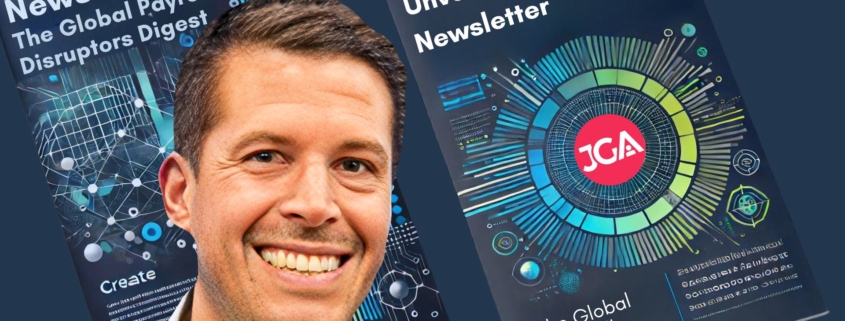Unveiling Innovations: The Global Payroll Disruptors Digest – Edition 2
Dear Readers,
In this edition of our biweekly newsletter, I want to highlight the exciting potential of Machine Learning (ML) and Artificial Intelligence (AI) in revolutionising payroll systems. These technologies are not just poised to redefine, but to significantly enhance the mechanisms of modern payroll operations.
I want to illuminate the transformative capabilities of these technologies and their inevitable integration into global payroll frameworks and help payroll professionals understand both the use cases and power of these technologies.
The transactional nature of payroll and its complexity makes AI and ML ideal due to the efficiency and precision enhancements these innovations can provide. However, embracing these technologies has its challenges. Given the sensitive nature of payroll data, implementing AI must be approached with meticulous attention to security, especially in light of the increasing number of cyber-attacks that continue to threaten digital infrastructures. A simple check on Google will show you that the number of payroll departments attacked by malicious actors and ransomware claims is growing.
However, these risks shouldn’t prevent us from achieving our payroll potential, especially as there are many ways to mitigate these challenges. From shadowing sensitive files and compartmentalising access roles within payroll systems to creating air-gapped backup systems for payroll data, organisations are learning to evolve and adapt, and that’s because the investment in AI and ML is worth it. An air-gapped backup system is a type of backup that is completely isolated from the network, making it immune to cyber-attacks. This is just one example of the advanced security measures that can be implemented when using AI in payroll systems.
AI’s potential to enhance payroll solutions is immense. So, let’s find out how AI can shape payroll practices, enhance accuracy, and transform the strategic nature of payroll.
The Promise of AI in Payroll
Artificial Intelligence is on the brink of revolutionising the payroll sector, promising to enhance accuracy, efficiency, and compliance. With its ability to process large datasets rapidly and with precision, AI stands to significantly streamline payroll operations. Technologies like TensorFlow, PyTorch, and Keras are leading the charge, providing the frameworks necessary for payroll developers to create complex models that can manage global payroll’s intricate and complex variables.
These tools facilitate advanced predictive analytics, enabling payroll systems to forecast outcomes based on historical data. For instance, TensorFlow, an open-source library developed by Google, allows for creating deep learning models that can efficiently predict employee tax withholdings or customise benefits packages. Similarly, PyTorch offers dynamic computational graphing that adapts to real-time data changes, which is ideal for managing the complexities of global payroll systems in fluctuating regulatory environments.
Security Challenges and Mitigation Strategies
Integrating AI into payroll systems introduces significant security challenges, particularly data privacy and protection. The sensitive nature of payroll data demands robust security measures to prevent breaches and ensure compliance with international data protection regulations. Advanced AI tools can aid in this aspect by implementing predictive models that detect potential security threats before they become issues.
Organisations can further mitigate risks through stringent governance frameworks that outline clear protocols for data management and AI interaction. For example, OpenAI’s GPT models can be configured to adhere to privacy standards, ensuring that all generated outputs remain compliant with GDPR and other privacy laws. Moreover, AI-driven security systems, like those powered by deep learning frameworks like Keras, can analyse payment patterns and flag anomalies to prevent fraud and theft.
Critical AI Applications in Payroll
1. Natural Language Processing (NLP) for Queries
NLP technologies transform payroll interactions by enabling systems to effectively understand and respond to human queries. Tools like OpenAI’s GPT and Google Cloud’s Dialogflow employ large language models to process common payroll inquiries, reducing the workload on human staff and enhancing user experience. For example, Oracle’s HR Helpdesk uses NLP to provide intelligent case management solutions, allowing employees to resolve issues swiftly and accurately.
2. Automating Payroll Calculations
Machine learning algorithms are set to automate complex payroll calculations, including adjustments for tax withholdings, bonuses, and overtime. With AI frameworks like TensorFlow and PyTorch, developers can build models that adapt to diverse payroll requirements across different jurisdictions, enhancing accuracy and reducing errors in payroll processing. Payroll companies are now leveraging these technologies to refine their payroll services, offering more reliable and efficient systems and relieving human staff from the burden of manual calculations.
3. Fraud Detection
AI excels at identifying patterns that may indicate fraudulent activity. AI-savvy payroll companies already offer services that can monitor payroll transactions in real time by employing machine learning algorithms to detect irregularities. These systems use anomaly detection techniques facilitated by scikit-learn and deep learning via Keras to analyse transaction data, flagging discrepancies that could indicate fraud, thus ensuring the integrity of payroll operations. It’s important to note that AI is not used to make final decisions about potential fraud, but rather to flag potential issues for human review, ensuring that the human element is still a crucial part of the process.
Looking Ahead: The Future of AI in Payroll
As we peer into the future landscape of payroll management, it’s evident that AI will play an increasingly pivotal role. The trajectory of AI development suggests that the next generation of payroll systems will be even more automated, intelligent, and integrated, providing unprecedented efficiency and accuracy.
Future AI enhancements include:
- Advanced predictive analytics.
- Enhanced customisation and scalability.
- Improved user interfaces that could include employee financial management tools that enhance financial wellness for employees.
Regulatory compliance automation and ethical AI Governance are further used as organisations seek to drive the development of governance frameworks that ensure fairness, transparency, and accountability in AI decisions, particularly regarding data privacy and employee rights.
As these developments unfold, it’s crucial for payroll leaders to stay informed and proactively discover how AI can be leveraged to drive their payroll operations forward. This proactive approach will empower leaders to make informed decisions and stay ahead in the evolving landscape of payroll management.
Payroll Tech News
SD Worx invests €3m to expand payroll services to Irish SMEs
The company expects to grow its customer base by up to 50 SMEs and create 40 new jobs in Ireland, growing its team to 115 as part of a €2.9 million investment.
CloudPay, a payroll services provider, lands $120M in new funding
CloudPay plans to put the proceeds from its latest fundraiser toward bringing on new integrated partners and investing in automation and AI tech.
Payoneer Pays $61 Million for HR/Payroll Platform Skuad
The deal is designed to bolster Payoneer’s efforts to serve as a “business-grade financial stack” for SMBs that operate on an international scale,
Payroll Disruptions
Dayforce Wallet Surpasses $4B in Payroll Delivered
According to Dayforce, across the solution’s global footprint, more than $4 billion in payroll has now been delivered through on-demand pay, early direct deposit, and pay cards to employees using Dayforce Wallet.
Payroll Recruitment, Staffing, Search & Consulting
JGA Recruitment Group: JGA Recruitment is the world’s leading niche payroll recruitment, staffing, search and consultancy partner. JGA has helped place leading C-Suite payroll influencers, directors, developers, sales VPs, product specialists, project managers and implementers at some of the most renowned global brands. If you are seeking support with a payroll-related vacancy, please contact:
USA: Tom Croughton | [email protected] | www.jgarecruitmentinc.com
UK & EMEA: Nick Day | [email protected] | www.jgarecruitment.com
I hope this edition has provided some valuable insights on the integration of AI in payroll. I am looking forward to your feedback and engagement as we continue to explore cutting-edge developments in the payroll landscape.
Kind regards,
Nick Day
Join the Conversation. Connect with me on LinkedIn to discuss and delve deeper into AI’s potential in payroll management.
Ready for More? Please save this email address in your safe senders list and never miss a future edition of this newsletter!
Image: ©2024 – JGA Recruitment




